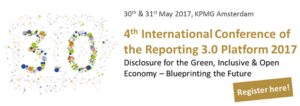
When and how will companies be able to say they have achieved bona fide sustainability? What changes do they need to make in assessing context, materiality, and success measurement? How will they know they’re creating net positive value sustainably, across all the capitals, nested within ecological, social and economic systems? And how can corporate leaders best advocate for regenerative multicapitalism and trigger the emergence of a green, inclusive and open economy? What’s the role of the reporting standard setters, accounting standard setters, data architects, governments, multilaterals and new business model entrepreneurs (and intrapreneurs)?
These are amongst the many questions to be spotlighted at the 4th International Reporting 3.0 Conference. Over the next couple of newsletters, we will highlight aspects of the four primary components of the Conference Program, which are linked to Reporting 3.0’s four Blueprint Projects on Reporting, Accounting, Data, and New Business Models.
Part 1: Reporting Blueprint – a principles-based approach to reporting that serves a green and inclusive economy
The first segment of the first day of the Reporting 3.0 Conference will focus on the Reporting Blueprint, which will be released as a final published report at the Conference. To highlight this unveiling, the Conference kicks off with a set of keynotes with Jonathon Porritt (Forum for the Future), Claudine Blamey (The Crown Estate), Alyson Slater (Global Reporting Initiative) and Neil Stevenson (International Integrated Reporting Council) that will reflect on current and future state of sustainability and integrated reporting. The keynotes lead into a plenary panel amongst the speakers, focusing on the Reporting 3.0 Recommendations, including calls for:
- A new set of principles connecting disclosure to serve a green, inclusive and open economy;
- Enhanced disclosure on purpose and connectedness, a context-based multicapital success measurement and new disclosures on the focus of education, collaboration and advocation towards scalability of disclosure from less than 10% of global multinationals to literally all organizations that need to earn from their stakeholders (or what R3 calls ‚rightsholders’) their „license to exist“;
- Understand the bigger work ecosystem in which such change can happen, acknowledging that reporting standard setters won’t be able to get there alone;
- A need to understand the seamless information flow from micro (organizations) to meso (industry and habitat) to macro (global) level, with the aim to constitute changes in the economic system design.
Allen White, Co-Founder of GRI and a Reporting 3.0 Validator, will join us by video-link from Boston to launch the Reporting Blueprint. Here’s a sneak peak at some of his thoughts on the current state of reporting and the role Reporting 3.0 plays in mapping the necessary future trajectory of disclosure:
His support for Reporting 3.0 has been tremendously helpful over the years and his clear understanding of what is supposedly the biggest challenge for the reporting standard setters then and now is on point!
The first segment of the Conference will then break into by three parallel workshops with speakers from BSI, DNV GL, BASF, WBCSD, True Price Foundation, ING, ABN AMRO and GRI. These parallel sessions are divided into three tracks on how practitioners can use the Reporting Blueprint to:
- Educate themselves with a baseline understanding of the current status, significant gaps, and necessary advancements in reporting
- Advocate for the needed transitions to a new reporting regime that’s fit-to-purpose for spurring the emergence of a green, inclusive & open economy; and
- Accelerate these changes to scale up internal transformation within the company and external transformation of the systems in its operating environment.
The Reporting 3.0 Conference on May 30/31 is an opportunity not to miss. Registration is possible at www.reporting3.org. A hashtag #reporting3 has been set up to tweet out before, at or after the conference.




